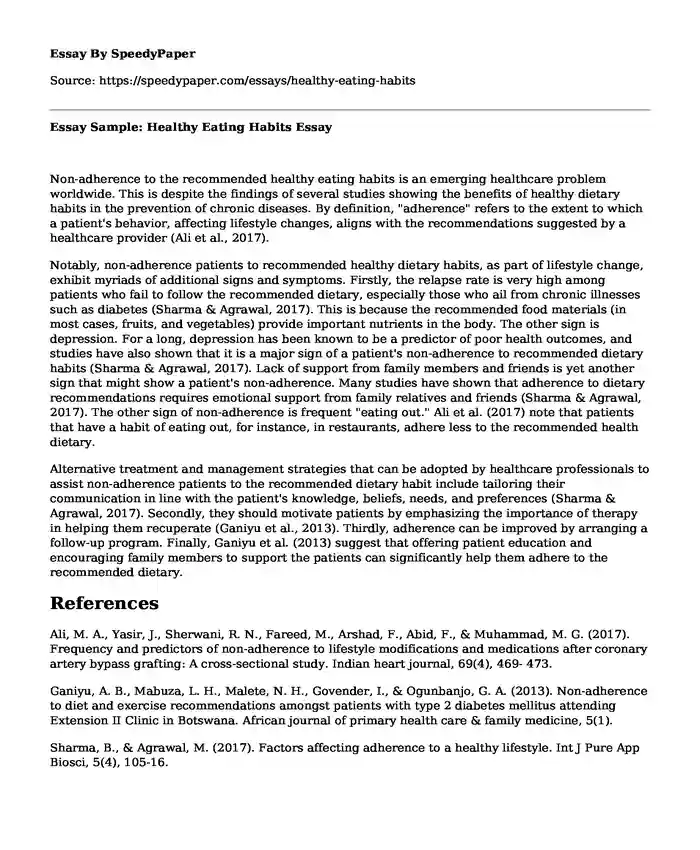
| Type of paper: | Research paper |
| Categories: | Food Diabetes Diet Nutrition Depression |
| Pages: | 2 |
| Wordcount: | 435 words |
Non-adherence to the recommended healthy eating habits is an emerging healthcare problem worldwide. This is despite the findings of several studies showing the benefits of healthy dietary habits in the prevention of chronic diseases. By definition, "adherence" refers to the extent to which a patient's behavior, affecting lifestyle changes, aligns with the recommendations suggested by a healthcare provider (Ali et al., 2017).
Notably, non-adherence patients to recommended healthy dietary habits, as part of lifestyle change, exhibit myriads of additional signs and symptoms. Firstly, the relapse rate is very high among patients who fail to follow the recommended dietary, especially those who ail from chronic illnesses such as diabetes (Sharma & Agrawal, 2017). This is because the recommended food materials (in most cases, fruits, and vegetables) provide important nutrients in the body. The other sign is depression. For a long, depression has been known to be a predictor of poor health outcomes, and studies have also shown that it is a major sign of a patient's non-adherence to recommended dietary habits (Sharma & Agrawal, 2017). Lack of support from family members and friends is yet another sign that might show a patient's non-adherence. Many studies have shown that adherence to dietary recommendations requires emotional support from family relatives and friends (Sharma & Agrawal, 2017). The other sign of non-adherence is frequent "eating out." Ali et al. (2017) note that patients that have a habit of eating out, for instance, in restaurants, adhere less to the recommended health dietary.
Alternative treatment and management strategies that can be adopted by healthcare professionals to assist non-adherence patients to the recommended dietary habit include tailoring their communication in line with the patient's knowledge, beliefs, needs, and preferences (Sharma & Agrawal, 2017). Secondly, they should motivate patients by emphasizing the importance of therapy in helping them recuperate (Ganiyu et al., 2013). Thirdly, adherence can be improved by arranging a follow-up program. Finally, Ganiyu et al. (2013) suggest that offering patient education and encouraging family members to support the patients can significantly help them adhere to the recommended dietary.
References
Ali, M. A., Yasir, J., Sherwani, R. N., Fareed, M., Arshad, F., Abid, F., & Muhammad, M. G. (2017). Frequency and predictors of non-adherence to lifestyle modifications and medications after coronary artery bypass grafting: A cross-sectional study. Indian heart journal, 69(4), 469- 473.
Ganiyu, A. B., Mabuza, L. H., Malete, N. H., Govender, I., & Ogunbanjo, G. A. (2013). Non-adherence to diet and exercise recommendations amongst patients with type 2 diabetes mellitus attending Extension II Clinic in Botswana. African journal of primary health care & family medicine, 5(1).
Sharma, B., & Agrawal, M. (2017). Factors affecting adherence to a healthy lifestyle. Int J Pure App Biosci, 5(4), 105-16.
Cite this page
Essay Sample: Healthy Eating Habits. (2023, Jan 29). Retrieved from https://speedypaper.net/essays/healthy-eating-habits
Request Removal
If you are the original author of this essay and no longer wish to have it published on the SpeedyPaper website, please click below to request its removal:
- Communication Essay Example for Students
- Healthcare Essay Sample: Interdisciplinary Teams Approach
- Effects of Forced Migration - Free Essay Example
- Free Essay on Bible's Prohibition Against Graven Images
- Paper Example on Grue Paradox and the Ravens Paradox
- Superstitious Beliefs and Happiness: A Correlation Study of Young Adults
- Paper Example. Principles of the U.S. Constitution
Popular categories




